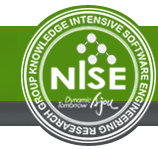|
Dr. Seok-Won Lee
Dr. Heather
Richter (Human Computer Interaction
research group)
Lei Liu (PhD),
Robin Gandhi (PhD)
Fall 2005 - present
There is a common recognition of non-trivial
Requirements Engineering (RE) problems for software-intensive
systems, which are understood as inherently complex clusters of
closely interdependent systems of systems operational in diverse
socio-technical environments. A key problem area lies in the
lack of systematic processes and techniques that address the
identification of diverse problem frame artifacts and the
traceability between them in the early RE stage. Throughout the
RE lifecycle as the problem frame artifacts pass through various
stages and are exchanged among the involved stakeholders, they
undergo multiple transformations and evolve into artifacts with
various complementary semantics at different levels of
abstractions. Such ontological drift during early RE stage is an
inevitable problem that often results in ill-structured,
meaningless, and missing RE process artifacts, which eventually
makes it hard to understand, predict and control critical system
emergent behaviors, such as with security and privacy concerns.
Therefore, to facilitate the later RE stages such as analysis
and negotiations, implementation of effective and efficient
traceability between various evolutions of the original problem
frame artifacts throughout the RE lifecycle is necessary. Such
traceability requires ability to describe and follow the
lifecycle of a requirement, in both backwards and forwards
direction (i.e. pre-traceability and post-traceability,
respectively).
Although, the issue of post-traceability has been significantly
addressed in research literature, little is known about
pre-traceability and its importance. Consequently, most
real-world problems attributed to poor requirements traceability
involve lack of (or inadequate) pre-traceability and its
seamless integration to post-traceability without loss of
original semantics. To address these issues, through the
proposed framework we seek to investigate systematic ways of
preserving early problem frame artifacts, their
interdependencies, and their evolution throughout the RE
lifecycle for supporting adequate pre-traceability &
post-traceability. Such traceability facilitates a unified view
and access to the problem frame artifacts dispersed across
various RE stages and involved stakeholders.
The problem domain of privacy requirements is of
particular interest to us as Privacy is recognized as one of the
most obscure emergent system behavior attribute, which is
affected by diverse contexts within socio-technical
environments. System behavior pertaining to Privacy is often
competing in nature with other functions and constraints of the
overall system. Through the TRECRE framework, we thrive to
achieve traceability between the problem frame artifacts that
reveals the nexus of causal chains between various domain
concepts and their proximity to privacy requirements.
|

